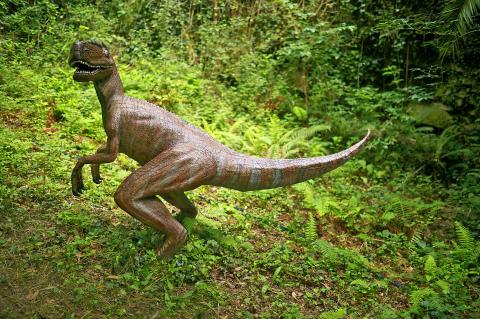Dinosaurs might have survived the catastrophic impact that ended their reign had the devastating asteroid that slammed into the Earth arrived at a “more convenient time,” a scientist has claimed. As a result humans would probably not exist.
The violent collision 66 million years ago, which occurred in the area that is now Mexico, triggered tsunamis across the oceans, caused powerful earthquakes and released enough heat to start many fires.
Material thrown into the air descended as acid rain, and also blocked the sun’s warmth, cooling the Earth temporarily, perhaps by tens of degrees Celsius.

Photo: Reuters
A thick blanket of dust that was thrown up darkened the globe.
The devastation wrought by the impact almost certainly explains the sudden death of the land-based dinosaurs, according to fresh analysis of the latest data.
However, one scientist on the team said the beasts might have prevailed had the asteroid struck earlier or later than it did.
Steve Brusatte, a paleontologist at Edinburgh University, was in an international team of researchers who reviewed the evidence on dinosaur extinction.
The group looked at work done on prehistoric climate and temperatures, changes in sea levels, volcanic activity and biodiversity, before reaching a consensus that the asteroid was the prime culprit.
“The asteroid almost certainly did it, but it just so happened to hit at a bad time when dinosaur ecosystems had been weakened by a loss of diversity,” Brusatte said. “If the asteroid had hit a few million years earlier, or a few million years later, then dinosaurs probably wouldn’t have gone extinct.”
The scientists’ report, published in Biological Reviews, found that while, largely, the dinosaurs were faring well at the time of the asteroid impact, the big plant-eating types, including the horned triceratops and duck-billed dinosaurs, had suffered a loss of biodiversity. There were fewer animals at the bottom of the food chain.
“The decline made those ecosystems at the very end of the Cretaceous [period], when the asteroid hit, considerably more vulnerable to collapse than those ecosystems that existed even a few million years before,” Brusatte said.
Dinosaur biodiversity rose and fell throughout their time on Earth over 150 million years.
Brusatte said he suspected that given a few million years more the large plant-eaters would have recovered, making the ecosystem more robust.
The asteroid, which was about 9.65km across, struck the Yucatan Peninsula and left a crater, the Chicxulub, measuring 19km deep by 199.5km wide.
The collision wiped out about 80 percent of the Earth’s species, though some dinosaurs survived to become the direct ancestors of birds.
“If the asteroid didn’t hit, I have no reason to believe they’d have gone extinct. And if dinosaurs didn’t go extinct, then mammals would have never had their opportunity to blossom. So if it wasn’t for that asteroid, then humans probably wouldn’t be here,” Brusatte said.

Incumbent Ecuadoran President Daniel Noboa on Sunday claimed a runaway victory in the nation’s presidential election, after voters endorsed the young leader’s “iron fist” approach to rampant cartel violence. With more than 90 percent of the votes counted, the National Election Council said Noboa had an unassailable 12-point lead over his leftist rival Luisa Gonzalez. Official results showed Noboa with 56 percent of the vote, against Gonzalez’s 44 percent — a far bigger winning margin than expected after a virtual tie in the first round. Speaking to jubilant supporters in his hometown of Olon, the 37-year-old president claimed a “historic victory.” “A huge hug

Two Belgian teenagers on Tuesday were charged with wildlife piracy after they were found with thousands of ants packed in test tubes in what Kenyan authorities said was part of a trend in trafficking smaller and lesser-known species. Lornoy David and Seppe Lodewijckx, two 19-year-olds who were arrested on April 5 with 5,000 ants at a guest house, appeared distraught during their appearance before a magistrate in Nairobi and were comforted in the courtroom by relatives. They told the magistrate that they were collecting the ants for fun and did not know that it was illegal. In a separate criminal case, Kenyan Dennis

A judge in Bangladesh issued an arrest warrant for the British member of parliament and former British economic secretary to the treasury Tulip Siddiq, who is a niece of former Bangladeshi prime minister Sheikh Hasina, who was ousted in August last year in a mass uprising that ended her 15-year rule. The Bangladeshi Anti-Corruption Commission has been investigating allegations against Siddiq that she and her family members, including Hasina, illegally received land in a state-owned township project near Dhaka, the capital. Senior Special Judge of Dhaka Metropolitan Zakir Hossain passed the order on Sunday, after considering charges in three separate cases filed

APPORTIONING BLAME: The US president said that there were ‘millions of people dead because of three people’ — Vladimir Putin, Joe Biden and Volodymyr Zelenskiy US President Donald Trump on Monday resumed his attempts to blame Ukrainian President Volodymyr Zelenskiy for Russia’s invasion, falsely accusing him of responsibility for “millions” of deaths. Trump — who had a blazing public row in the Oval Office with Zelenskiy six weeks ago — said the Ukranian shared the blame with Russian President Vladimir Putin, who ordered the February 2022 invasion, and then-US president Joe Biden. Trump told reporters that there were “millions of people dead because of three people.” “Let’s say Putin No. 1, but let’s say Biden, who had no idea what the hell he was doing, No. 2, and